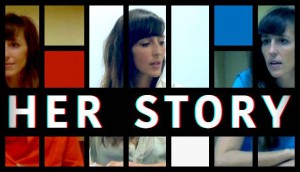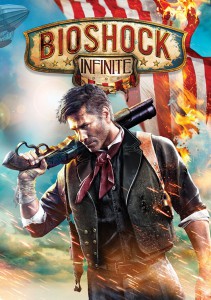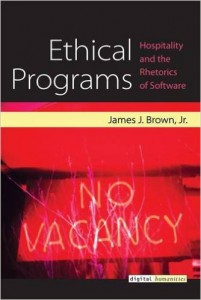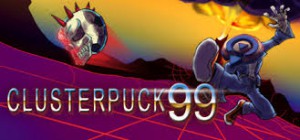Join us on October 28 at 12:20 in the ModLab (Fine Arts 215) for a visit from the game studio PHL Collective. PHL Collective is a Philadelphia-based game studio comprised of local artists, designers, and programmers. Founder Nick Madonna will lead a discussion about the process of developing and designing their new game, Clusterpuck 99.
 Join us Wednesday, November 18 at 12:15 in the ModLab (Fine Arts 215) for a Well Played session of Her Story. Created by Sam Barlow, the game asks the player to search a database of video clips and to piece together a story of murder and deception. The game plays with detective story tropes, and it also uses a 1990’s aesthetic. However, its most interesting trait might be that it is a game about databases and how we navigate them. During this session, we’ll discuss these ideas and more.
Join us Wednesday, November 18 at 12:15 in the ModLab (Fine Arts 215) for a Well Played session of Her Story. Created by Sam Barlow, the game asks the player to search a database of video clips and to piece together a story of murder and deception. The game plays with detective story tropes, and it also uses a 1990’s aesthetic. However, its most interesting trait might be that it is a game about databases and how we navigate them. During this session, we’ll discuss these ideas and more.
Those attending will have an opportunity to both play and discuss Her Story. This event is free and open to the public.
 Tuesday, November 10th
Tuesday, November 10th
11:00AM – 2:00PM
Multipurpose Room, Campus Center
The Political Science Department and the Digital Studies Center invite faculty, students and the community to a symposium to launch a new Digital Studies Certificate option in Digital Politics
Join us in exploring the disruptive impact of digital technology and social media on politics at home and abroad.
Agenda:
- Welcome – Dr. Richard Harris, Chair Political Science and Dr. James Brown, Director Digital Studies Center
- Announcement of Certificate Focus – Dean Kriste Lindenmeyer
- Deciphering Digital Politics Panel
- Doing Digital Politics Panel
Register at: polisci.camden.rutgers.edu/digital-politics
 Join us Wednesday, October 21 at 12:15 in the ModLab (Fine Arts 215) for a Well Played session of Bioshock Infinite. Dr. Aaron Hostetter, Assistant Professor of English, will lead a discussion about how systemic racism is represented in the game. The player of Bioshock Infinite is confronted with a number of scenes during which they must navigate the fictional world of Columbia and its deep-seated racism. We’ll discuss two scenes, “Raffle Park” and “Fraternal Order of the Raven,” and how they implicate the player in the racial dynamics of Columbia.
Join us Wednesday, October 21 at 12:15 in the ModLab (Fine Arts 215) for a Well Played session of Bioshock Infinite. Dr. Aaron Hostetter, Assistant Professor of English, will lead a discussion about how systemic racism is represented in the game. The player of Bioshock Infinite is confronted with a number of scenes during which they must navigate the fictional world of Columbia and its deep-seated racism. We’ll discuss two scenes, “Raffle Park” and “Fraternal Order of the Raven,” and how they implicate the player in the racial dynamics of Columbia.
Those attending will have an opportunity to both play and discuss Bioshock Infinite. This event is open to the public.
In honor of Open Access Week, October 19 through 25, the University of Texas at Austin’s Digital Writing and Research Lab (DWRL) will lead a collaborative annotation of Digital Studies Center Director (and DWRL alumnus) James Brown’s new book Ethical Programs: Hospitality and the Rhetorics of Software (University of Michigan Press, 2015) using the Hypothes.is platform. Hypothes.is is free and open source software that allows for annotation, sentence-level critique, and note-taking on Web documents. Guided by DWRL alumnus Dr. Jeremy Dean, Director of Education at Hypothes.is, the annotation event will open up a conversation about software, rhetoric, and networked life.
 Brown’s Ethical Programs is part of Digital Culture Books, an imprint of the University of Michigan Press. It explores the rhetorical potential and problems of a new era of hosts and guests and asks how both human and computational machines develop “ethical programs” for engaging with those that arrive on our virtual doorsteps. This makes it an ideal text to annotate using Hypothes.is, a platform which invites people from around the world to collaborate and discuss online texts.
Brown’s Ethical Programs is part of Digital Culture Books, an imprint of the University of Michigan Press. It explores the rhetorical potential and problems of a new era of hosts and guests and asks how both human and computational machines develop “ethical programs” for engaging with those that arrive on our virtual doorsteps. This makes it an ideal text to annotate using Hypothes.is, a platform which invites people from around the world to collaborate and discuss online texts.
As with all Digital Culture books, the University of Michigan Press has made the full text of the book available for free online. The Web version of Ethical Programs will be presented with the Hypothes.is annotation software installed, and students in Professor Casey Boyle’s “Rhetoric & Digital Humanities” class at UT-Austin will help lead the annotation of Brown’s book. Scholars and students from any discipline or institution are invited to read and discuss the book, using Hypothes.is to contribute to a collaborative annotation of the text. Interested participants can simply sign up for a free Hypothesis account to join the in-line discussion of the text. Tag your annotations with “digitalculturebooks” and follow the conversation here. The book is also available in hard copy, and during Open Access Week Michigan is offering a 30% discount on print copies (discount code UMHYPEP15).
This week-long event is co-sponsored by the DWRL as well as the Rutgers-Camden Digital Studies Center. The collaboration between Hypothes.is and Michigan Publishing’s Digital Culture Books is part of a generous grant from the Mellon foundation to explore the possibilities of annotation to enhance scholarly communication.

